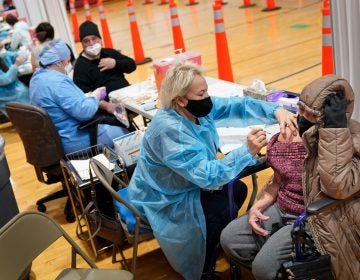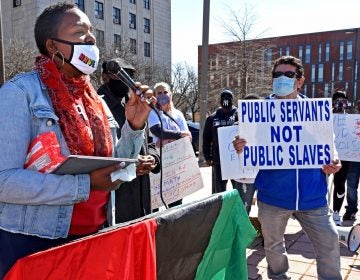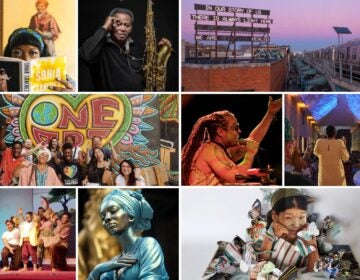N.J. Gov. Murphy signs off on $15 million to aid the arts
N.J. Gov. Phil Murphy has signed off on $15 million in grants to help arts and culture programs hit hard by the pandemic.

Gov. Phil Murphy signs arts and cultural institution relief legislation at the West End Arts Center in Long Branch, New Jersey on April 8, 2021. (Edwin J. Torres/NJ Governor’s Office).
Ask us about COVID-19: What questions do you have about the coronavirus and vaccines?
New Jersey Gov. Phil Murphy signed a bill Thursday allocating $15 million in federal COVID-19 relief to arts and culture venues throughout the state.
The bill is part of a $100 million relief effort that aims to help small businesses recover from the pandemic.
Murphy, who signed the bill at the West End Arts Center in Long Branch, Monmouth County, said the aid will help secure the state’s post-pandemic future.
“Perhaps at no other time in our recent history have we needed the arts more than we do now,” he said. “Although they are a few hours of much-needed escape, the arts have always been where we’ve turned to help us put the challenges of the world into a greater context.”
The money will be distributed as grants. Half of the $15 million will be available through the state Economic Development Authority for for-profit organizations. The other half will be available for nonprofit groups through the New Jersey State Council on the Arts. The application process is still being developed.
Like all businesses, arts and performance venues are going through tough times since closing their doors due to the pandemic.
“And like all businesses [we] came to realize that the longer the shutdown persisted, the greater the risk [to our] stability and, perhaps, survival of our organization,” said Gabe Barabas, executive producer of the New Jersey Repertory Company, which is based at the West End Arts Center.
He noted his group shut down in the middle of a production and that “the set for the play still stands on our abandoned and darkened stage waiting to come to life again and the return of our audiences.”
Barabas said the company has received “tremendous” support from the EDA, the state arts council, as well as the Monmouth County CARES Economic Assistance Grant Program, calling them “critical” to their survival.
“In our case, the funds have enabled us to retain employees, launch virtual programs, stay connected and modify and upgrade our HVAC and filtration system and actually convert to touchless fixtures [in] our restrooms,” he added, “all with the goal of creating a safer environment for our audiences upon their return.”
Barabas’s group was not the only one that had to close production in mid-act.
The Atlantic City Ballet was three days into its spring season last year before the company had to close production. There was also concern that the curtain would be down permanently, according to the ballet’s managing director Alexandria Pieroni. The company pivoted into virtual offerings for the fall with a “donate-what-you-can” model. In January, the company offered a subscription to five ballets for $50 with one ballet per month.
Thanks to help from the state and Atlantic County, that work has continued.
“What that means going down the road, like, in the future, I don’t know at this point,” said Pieroni. “It really is going to depend on whether everything opens up in September again, and whether audiences will come.”
Despite a significant increase in COVID-19 cases, the state recently raised capacity limits for outdoor events like concerts to 200 people. Larger venues with a fixed seating capacity of 2,500 or more also saw an increase in the number of patrons they can welcome, including 20% for indoor venues and 30% for outdoor venues. The capacity limits exclude those who are working in the venue.

Get daily updates from WHYY News!
WHYY is your source for fact-based, in-depth journalism and information. As a nonprofit organization, we rely on financial support from readers like you. Please give today.





![CoronavirusPandemic_1024x512[1]](https://whyy.org/wp-content/uploads/2020/03/CoronavirusPandemic_1024x5121-300x150.jpg)


